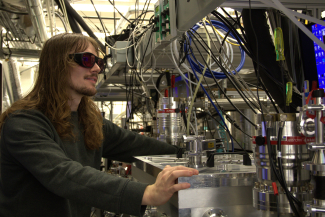Nick Jenkins, a graduate student at JILA, an institute jointly operated by the University of Colorado Boulder and the National Institute of Standards and Technology (NIST), has been awarded the esteemed Nick Cobb Memorial Scholarship. Mentored by JILA Fellows and University of Colorado Boulder professors Margaret Murnane and Henry Kapteyn, Jenkins' research focuses on pioneering tabletop extreme ultraviolet (EUV) microscopy techniques using high-harmonic generation light sources. This innovative work has positioned him as a standout recipient of this significant award.
The Nick Cobb Memorial Scholarship, valued at $10,000, is an annual grant given to an exceptional graduate student studying advanced lithography or a related field. The scholarship, jointly funded by Siemens EDA and SPIE, is more than just financial support. It covers a range of educational expenses, including tuition and fees, textbooks, supplies, and even computer equipment necessary for academic pursuits.
Jenkins' work in EUV microscopy is not just academically excellent but also aligns closely with the technological and innovative spirit of the scholarship. His research under the guidance of Professors Murnane and Kapteyn at JILA is breaking new ground in the field of lithography, contributing to the development of advanced imaging techniques that could revolutionize various technological sectors.
Jenkins' achievement is a testament to his hard work and dedication to his research. It also highlights the supportive and innovative environment at JILA, fostering groundbreaking research in advanced lithography. This scholarship acknowledges Jenkins' accomplishments and supports his future EUV microscopy and lithography endeavors.
Written by Kenna Hughes-Castleberry, JILA Science Communicator



 The Physics Frontiers Centers (PFC) program supports university-based centers and institutes where the collective efforts of a larger group of individuals can enable transformational advances in the most promising research areas. The program is designed to foster major breakthroughs at the intellectual frontiers of physics by providing needed resources such as combinations of talents, skills, disciplines, and/or specialized infrastructure, not usually available to individual investigators or small groups, in an environment in which the collective efforts of the larger group can be shown to be seminal to promoting significant progress in the science and the education of students. PFCs also include creative, substantive activities aimed at enhancing education, broadening participation of traditionally underrepresented groups, and outreach to the scientific community and general public.
The Physics Frontiers Centers (PFC) program supports university-based centers and institutes where the collective efforts of a larger group of individuals can enable transformational advances in the most promising research areas. The program is designed to foster major breakthroughs at the intellectual frontiers of physics by providing needed resources such as combinations of talents, skills, disciplines, and/or specialized infrastructure, not usually available to individual investigators or small groups, in an environment in which the collective efforts of the larger group can be shown to be seminal to promoting significant progress in the science and the education of students. PFCs also include creative, substantive activities aimed at enhancing education, broadening participation of traditionally underrepresented groups, and outreach to the scientific community and general public.